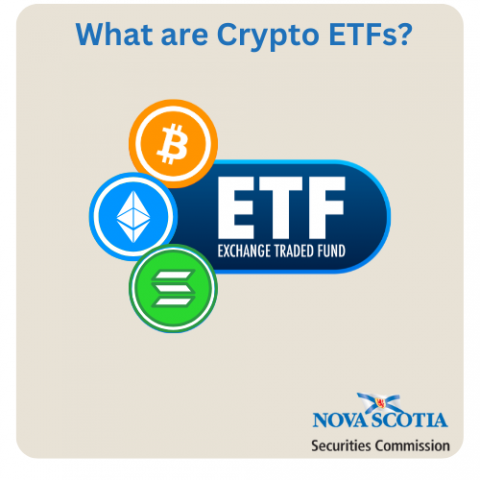Submitted by nsscadmin on

The number of exchange-traded funds (ETFs) in Canada and the United States that allow investors to invest in crypto assets has increased rapidly in the last few years. In case you weren’t aware, the first ever crypto ETF, a Bitcoin ETF to be exact, was approved and launched in Canada in 2021. There are currently more than a dozen crypto ETFs approved in Canada that allow investors to invest in Bitcoin, Ethereum, and most recently, Solana and XRP. But what are crypto ETFs, and what are the pros and cons of investing in them? Let’s find out.
Before we begin as always, the Nova Scotia Securities Commission does not provide investment advice. We are not advising or recommending investors to invest in crypto ETFs. This post is simply to educate investors on crypto ETFs so they can be informed when working with their broker and making investment decisions.
A crypto ETF allows investors to gain exposure to crypto assets without having to purchase and store the digital asset themselves. For investors that find Blockchain, hot and cold wallets, and other crypto terms and tech complicated, it still allows them to invest in the assets.
There are two different kinds of crypto ETFs currently available to investors – Spot ETFs, and Futures ETFs.
In a spot ETF the investment fund invests directly in the crypto asset and holds it in a secure cold wallet. They essentially purchase crypto assets and sell percentage units in them as ETFs that investors can purchase. Think of how a gold ETF allows you to invest in gold without actually buying physical gold. A spot crypto ETF works the same way.
In a futures ETF the investor gains indirect exposure to price movements of the underlying crypto asset. The fund manager of the ETF uses futures contracts of the specified crypto asset to mirror price movements of the crypto asset without purchasing the actual crypto assets. Futures contracts obligate the involved parties to buy or sell the crypto asset at a set price at a set future date. However, futures ETFs will manage its futures position to avoid having to buy or sell the physical crypto assets.
If you’re thinking about investing in crypto assets by purchasing crypto ETFs here are some of the pros and cons to consider.
Pros:
Allows crypto asset exposure without ownership
You don’t need to be a crypto expert or own a hot or cold wallet to invest in a crypto ETF. This allows you to invest without the risks involved with holding the assets yourself.
Potential tax benefits
Currently the only way to hold crypto assets in a registered account such as a TFSA, RRSP, or FHSA and potentially take advantage of any tax benefits is by purchasing a crypto ETF. Actual crypto assets, such as Bitcoin and Ethereum are not on the qualified investments list and cannot be held in registered accounts.
Cons:
Fees
ETFs have fees, including management expense ratios that can reduce your returns. Crypto ETFs may have higher fees than regular ETFs
Price divergence
Crypto ETFs are expected to track and duplicate the price change of the underlying crypto asset you’re investing in. However, the prices may diverge slightly meaning your returns may not completely match those you would receive if you invested in the crypto asset directly.
Crypto ownership
For some investors the lack of ownership of the crypto asset you are investing in may be seen as a con instead of a pro.
Less freedom to buy and sell assets
If you’re trading crypto assets directly you can purchase or sell assets 24/7, 365 days a year as crypto markets have no set hours. Since crypto ETFs trade on major securities exchanges, you will only be able to buy and sell them when the markets are open, typically Monday to Friday.
One last thing to remember when investing in crypto ETFs is that the volatility risks that come with investing in crypto assets also carry over to investing in crypto ETFs. If you’re accustomed to investing in regular ETFs, you may find this volatility quite high. When investing in crypto ETFs or any asset, be sure to examine all the risks and never invest more than you can afford to lose.
